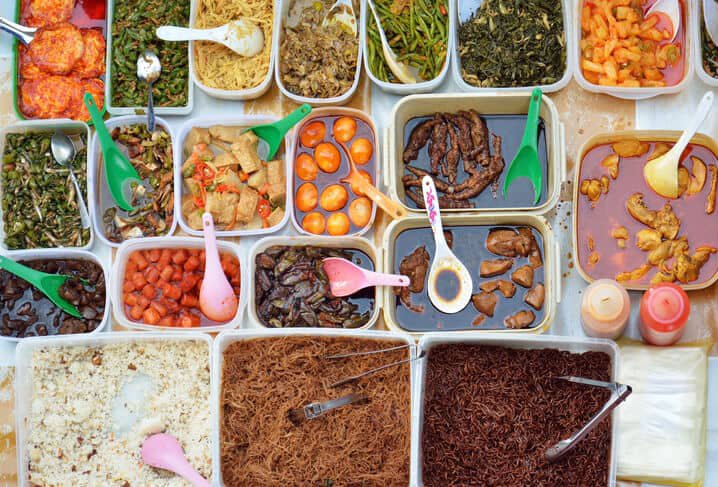The pleasures of a simple and hearty meal cannot be understated. In a culture-rich country like ours, the diversity offers a plethora of incredible cuisines, whether Chinese, Indian, Malay or Peranakan food. Once in a blue moon, whether from a hygiene issue or not, some of these meals may not sit well with our gut, leading to a mild and temporary discomfort in the stomach. In comes the antacid or anti-bloating medication.

For a portion of the population, this discomfort is a daily routine of painful spasms in areas of the stomach for the duration of the day. The pain can come across differently to people, with some describing it as:
- Cramping pain
- Stabbing pain
- Sharp pain
- A migraine in the stomach/abdomen
These pain pangs are unpredictable and can leave a person immobilised, affecting their emotional, social and professional life. These are symptoms of the Irritable Bowel Syndrome (IBS), a common gut disorder that affects 10% to 15% of the population worldwide. People who suffer from IBS suffer painful spasms at weird times of the day.
Young adults usually suffer from this chronic condition, which affects the large intestine (colon), for which there is no current cure. On the spectrum of gastrointestinal conditions, IBS is considered manageable and is benign, as it does not cause permanent damage to your intestines or digestive system.
What causes IBS?

The exact cause of this condition is still unknown. However, health experts believe that this condition occurs due to poorly coordinated signals between the brain and the intestines, which causes your body to overreact to the changes that happen in the digestive system. The overreaction of your digestive system can result in pain, diarrhoea and constipation.
IBS does not pose other serious health issues or mortality, but it has a major impact on a person’s quality of life. In a person who does not experience IBS, the walls of their intestines are lined with multiple layers of muscle that constantly contract and relax when food moves from the stomach to the rectum through the intestinal tract.
Someone who suffers from IBS will experience stronger contractions which tend to last longer than usual after a meal, causing bloating, diarrhoea and gas when food passes through the intestinal tract.
Am I at risk?

IBS can happen to people of all ages and gender, but there are certain factors associated with a higher risk factor.
- Young: This condition affects mainly people under 45 years old
- Female: About twice as many women compared to men suffer from this persistent condition
- Family History: Studies suggest that individuals who have a family history of IBS have a higher chance of having it
How can I manage IBS?
?qlt=85&ts=1695118527944&dpr=off)
One of the key ways to manage IBS is by identifying the symptoms and managing the respective triggers. A healthy and well-balanced diet consisting of your recommended daily nutritional intake is key. If you suffer from IBS, you may start to notice certain symptoms after you eat certain types of food. Constipation, diarrhoea and bloating are the most common among people with IBS.
The causes of IBS differ for each individual. Hence, it would help to keep track of how you react to common food triggers. Keep a journal of the food you take in a day and the corresponding results of it to help you identify what to avoid. Avoiding or completely eliminating these triggers may result in lesser constipation, diarrhoea or bloating.

Foods that have been identified to trigger symptoms of IBS related to constipation are:
- Bread and cereal
- Processed food like cookies and chips
- Alcohol, coffee and fizzy drinks
- Dairy products, such as cheese and milk
Here are eating practices that help to relieve the symptoms of IBS related to constipation:
- Opt for natural and unprocessed sugar like honey
- Ensure sufficient intake of liquids throughout the day
- Increase intake of fibre, such as whole grain bread, fruits and vegetables. Strike a healthy balance of fibre intake (25g for women and 38g for men) as overloading on fibre could aggravate diarrhoea
In some cases, IBS triggers diarrhea-like symptoms. These are dietary practices that have been identified to aggravate diarrhoea:
- Having too much fibre in the diet
- Alcoholic, gassy or caffeinated drinks
- Fried food
- Dairy products especially for those who have lactose intolerance.

Eating practices that help to moderate symptoms of diarrhoea are:
- Control your fibre intake
- Avoid eating food at a combination of temperatures such as an iced drink with hot porridge
- Limit or reduce intake of gas-producing vegetables like broccoli, onions and cabbage
- Consume your meals in smaller and more frequent portions
I’ve changed my eating habits, but my symptoms persist. Is there another cause for IBS?
Besides dietary practices, stress and anxiety can also cause IBS symptoms to flare up. Studies have also shown that increased levels of stress lead to colon spasms in people with IBS. While the nervous system manages the stressors well, their colons are too sensitive to the responses. Stress, anxiety and worry all compound the symptoms of IBS.
The root of IBS lies in stress and anxiety management. Besides practising a balanced diet, ensure you get regular exercise and sufficient sleep daily. Speak to family and friends about your condition to help them better understand what you are going through and how the condition affects your daily life.

IBS can happen to people of all ages and gender, but there are certain factors associated with a higher risk factor.
- Young: This condition affects mainly people under 45 years old
- Female: About twice as many women compared to men suffer from this persistent condition
- Family History: Studies suggest that individuals who have a family history of IBS have a higher chance of having it
Take your savings to another level!
There are also certain medications that may trigger symptoms of IBS:
- Antibiotics
- Anti-depressants
- Cough Syrup

The above articles are intended for informational purposes only. AIA accepts no responsibility for loss, which may arise from reliance on information contained in the articles.
Related articles

